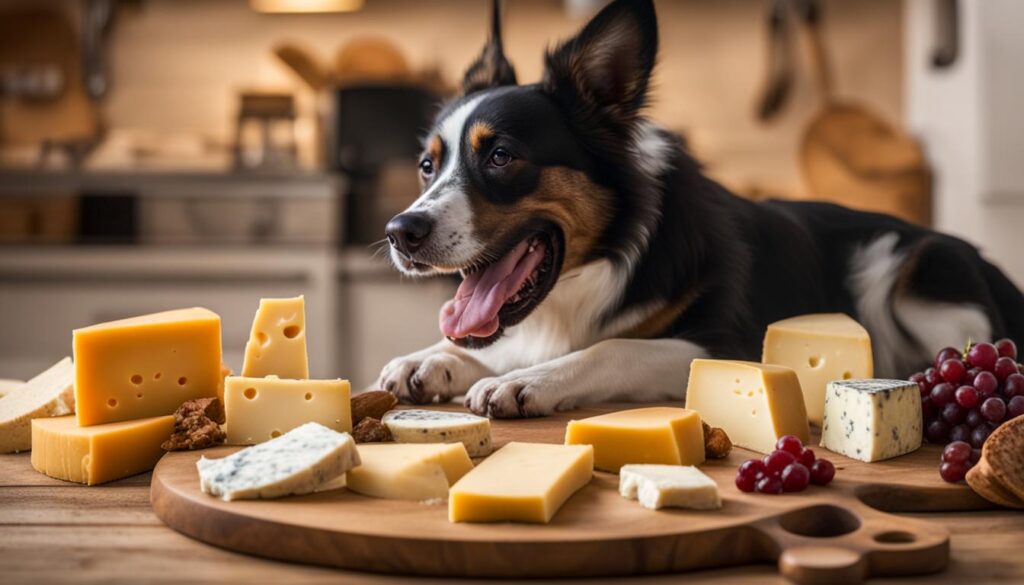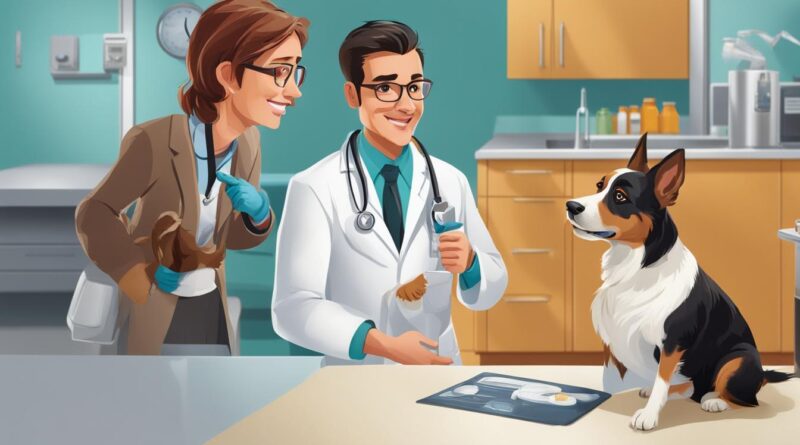Can Dogs Eat Provolone Cheese? Vet Insights
When it comes to our furry friends, we always want to make sure we’re feeding them the right foods. But what about provolone cheese? Can dogs eat it? In this article, we’ll explore the topic of dogs and provolone cheese, and what you need to know about incorporating it into your dog’s diet.
Provolone cheese is generally not toxic to dogs, but there are some risks associated with feeding it to them. While some dogs can tolerate cheese, others may be lactose intolerant and experience digestive issues. In addition, provolone cheese is high in fat and sodium, which can lead to health problems like obesity and pancreatitis in dogs. It’s important to consult with a veterinarian to determine if provolone cheese is safe for your dog and to limit their consumption.
Key Takeaways:
- Provolone cheese is generally not toxic to dogs, but some may be lactose intolerant and experience digestive issues.
- Provolone cheese is high in fat and sodium, which can lead to health problems in dogs like obesity and pancreatitis.
- Consult with a veterinarian to determine if provolone cheese is safe for your dog and to limit their consumption.
Is Provolone Cheese Bad for Dogs?
Provolone cheese is not toxic to dogs, but it can be problematic for certain pups.
Dogs that are lactose intolerant may experience digestive issues like flatulence, discomfort, diarrhea, or vomiting if they consume provolone cheese.
Additionally, the high fat and sodium content in provolone cheese can lead to health issues like obesity and pancreatitis in dogs, especially if consumed in large quantities or over an extended period of time.
Puppies are particularly sensitive to cheese, and even small amounts can cause vomiting and diarrhea.
It’s important to choose lower fat, sodium, and lactose cheese options if you do decide to feed it to your dog.
Risks of Feeding Dogs Provolone Cheese
The risks of feeding dogs provolone cheese include:
- Lactose intolerance: Dogs that are lactose intolerant may experience digestive issues such as flatulence, discomfort, diarrhea, or vomiting.
- High fat content: Provolone cheese is high in fat, and consumption in large quantities or over time can lead to obesity and other health problems.
- High sodium content: Provolone cheese is also high in sodium, which can be harmful to dogs, especially those with existing health conditions like heart or kidney problems.
“It’s important to choose lower fat, sodium, and lactose cheese options if you do decide to feed it to your dog.”
Better-for-Dogs Cheese Options
When it comes to cheese options for dogs, provolone may not be the best choice. However, there are several cheeses that are considered safer and healthier alternatives. These cheeses have lower fat, sodium, and lactose content, making them better options for your furry friend.
Cottage Cheese
Cottage cheese is a great choice for dogs, as it is low in fat and sodium. It is also a good source of protein and calcium. However, be sure to choose plain cottage cheese without any added ingredients, such as flavorings or seasonings, which can be harmful to dogs.
Swiss Cheese
Swiss cheese is another safe option for dogs. It has a lower lactose content compared to other cheeses, making it easier for dogs to digest. Swiss cheese also provides essential nutrients like calcium and protein.
Parmesan Cheese
Parmesan cheese is a flavorful and low-sodium cheese option for dogs. It has a strong aroma and taste, which can make it a tasty treat for your canine companion. Just be sure to grate the cheese finely to prevent choking hazards.
Cheddar Cheese
Cheddar cheese is a popular choice among dog owners. It has a rich and sharp flavor that many dogs enjoy. When feeding cheddar cheese to your dog, opt for the low-fat varieties to ensure a healthier snack.
Mozzarella Cheese
Mozzarella cheese is another low-fat and low-sodium option for dogs. It is a mild and soft cheese that can be easily chewed and digested. Mozzarella cheese can be a great addition to homemade dog treats or as a reward during training sessions.
Remember, while these cheeses are considered safer for dogs, it’s still important to feed them in moderation. Each dog is unique, and it’s essential to consider their specific dietary needs and any health conditions they may have. Always consult with your veterinarian before introducing new foods into your dog’s diet to ensure their safety and well-being.

How to Safely Feed Cheese to Your Dog
When it comes to feeding cheese to your furry friend, it’s important to do so safely and in moderation. Here are some guidelines to ensure your dog can enjoy cheese as a special treat:
Consult with a Veterinarian
Before introducing any new foods to your dog’s diet, it’s always best to consult with a veterinarian. They can provide valuable insights into your dog’s specific needs and help you determine if cheese is a suitable addition to their diet.
Choose the Right Cheese
Not all cheeses are created equal when it comes to canine consumption. Opt for low-fat, low-sodium, and preferably low-lactose cheese options. These choices minimize the risk of digestive issues and health problems for your dog.
Monitor Portion Sizes
The portion size of cheese for dogs depends on their size. Smaller dogs should only be given one or two small pieces, while larger dogs can handle five to six pieces. Remember, cheese should only make up 10% of your dog’s overall diet.
Observe Your Dog’s Reaction
Every dog is unique, and some may have sensitivities or allergies to certain types of cheese. Monitor your dog’s reaction to cheese, and if you notice any negative symptoms like vomiting, diarrhea, or discomfort, adjust their intake accordingly or consult with a veterinarian.
Feeding cheese to your dog can be a fun and tasty way to provide canine-friendly treats. Just remember to prioritize their safety and well-being by following these guidelines. With the right cheese choices and portion control, you can make cheese a delicious and safe addition to your dog’s diet.
Conclusion
When it comes to including cheese in your dog’s diet, moderation is key. While provolone cheese may be safe for some dogs in small amounts, it’s important to consult with a veterinarian before introducing it into your furry friend’s meals. Cheese can be a tasty treat for dogs, but its high fat, sodium, and lactose content means it shouldn’t make up a significant portion of their diet.
There are safer cheese options available for dogs, such as cottage cheese, Swiss, Parmesan, cheddar, and mozzarella. These cheeses have lower fat, sodium, and lactose content compared to provolone cheese, making them a better choice for your dog’s health. However, it’s still important to feed these cheeses in moderation.
Remember to always consider your dog’s individual dietary needs and any health conditions they may have before incorporating cheese into their meals. Consult with a veterinarian to determine the appropriate portion sizes and frequency of cheese consumption for your dog. By taking these factors into account, you can ensure that your furry companion enjoys cheese in a safe and healthy way.
FAQ
Can dogs eat provolone cheese?
Provolone cheese is generally not toxic to dogs, but there are some risks associated with feeding it to them. It’s important to consult with a veterinarian to determine if provolone cheese is safe for your dog and to limit their consumption.
Is provolone cheese bad for dogs?
While provolone cheese is not toxic to dogs, it can be problematic for certain pups. Dogs that are lactose intolerant may experience digestive issues if they consume provolone cheese. Additionally, the high fat and sodium content in provolone cheese can lead to health problems like obesity and pancreatitis in dogs.
What are some better-for-dogs cheese options?
Cottage cheese, Swiss, Parmesan, cheddar, and mozzarella are considered safer cheese options for dogs. These cheeses have lower fat, sodium, and lactose content compared to provolone cheese. Always choose cheese with no added ingredients that can be dangerous to dogs.
How can I safely feed cheese to my dog?
It’s important to consult with a veterinarian before introducing new foods to your dog’s diet. When feeding cheese to your dog, do so as a special treat or for training purposes. Choose low-fat, low-sodium, and preferably low-lactose cheese options. The portion size of cheese for dogs depends on their size, with smaller dogs needing only one or two small pieces and larger dogs able to handle five to six pieces. Monitor your dog’s reaction to cheese and adjust their intake accordingly.
Can dogs eat cheese in moderation?
While provolone cheese may be safe for some dogs in moderation, it’s best to consult with a veterinarian before feeding it to your furry friend. Cheese should not make up a significant portion of their diet due to its high fat, sodium, and lactose content. Remember to always feed cheese in moderation and consider your dog’s individual dietary needs and health conditions.


